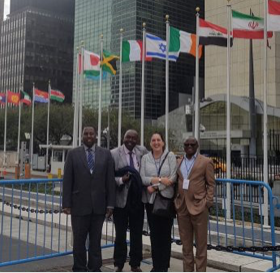‘Conflict, Climate Change, and Disruptions in Food and Water Systems’
By Laura Lewis, Sosten Chiotha, John Obiri and Mawuli Dzodzomenyo
On October 22-23, BRECcIA co-investigators Prof Sosten Chiotha (LEAD, Southern and Eastern Africa), Dr Mawuli Dzodzomenyo (University of Ghana), Prof Laura Lewis (University of Southampton) and Prof John Obiri (Masinde Muliro University of Science and Technology, Kenya), attended the United Nations Development Programme/UK Research and Innovations/GCRF Workshop ‘Conflict, Climate Change, and Disruptions in Food and Water Systems’ at the United Nations in New York City.
 The purposes of this research and development workshop were 1) to encourage collaboration and cooperation across policy/government, academic and development sectors in order to identify and evaluate challenges relating to climate change, violent conflict and disruptions in food and water systems; and 2) to build resilience and offer solutions for effective policy responses to such disruptions.
The purposes of this research and development workshop were 1) to encourage collaboration and cooperation across policy/government, academic and development sectors in order to identify and evaluate challenges relating to climate change, violent conflict and disruptions in food and water systems; and 2) to build resilience and offer solutions for effective policy responses to such disruptions.
We focused on four sub-themes: 1) Tipping points; 2) Governance; 3) Gender dynamics; and 4) Shock-responsive data, while building on the UN Integrated Strategy for the Sahel Support Plan (https://www.un.org/africarenewal/sahel/documents/un-support-plan-sahel-working-together-prosperous-and-peaceful-sahel) and the UN Resilience Framework (https://sustainabledevelopment.un.org/content/documents/642997-Bhamra-Resilience%20Framework%20For%20Measuring%20Development.pdf),
The workshop opened with an overview by Abdoulaye Mar Dieye, the Director of the UN’s Global Policy Bureau, and Andrew Thompson, the Executive Chair of the UKRI’s Arts and Humanities Research Council. During the two-day meeting, BRECcIA researchers Prof Obiri presented on shock-responsive data, Prof Chiotha on agriculture and food systems in sub-Saharan Africa, and Prof Lewis on anthropology and development. Additional presentations included an overview of the GCRF and food, security and resilience; the UNDP Sahel Strategy, resilience guidance and the World Bank’s Famine Early Action Mechanism (http://www.worldbank.org/en/programs/famine-early-action-mechanism); communications between the environmental science research community, other researchers and policy makers; the National Science Foundation’s Geosciences Program Innovations at the Nexus of Food, Energy and Water Systems (INFEWS) (https://www.nsf.gov/funding/pgm_summ.jsp?pims_id=505241); the International Water Management Institute (IWMI) (http://www.iwmi.cgiar.org/); gaps in understanding gender relations in the context of climate change and conflict; and global tipping points.
For BRECcIA there were several important takeaways:
1) Climate change in the Anthropocene is becoming increasingly fast and complex. Researchers need to find critical nexuses where academic research can be translated into policy and new development models. Rapid responses are key. For BRECcIA, this might mean strengthening the incorporation of rapid response approaches into its capacity building objectives. Models and new practices emerging from our work also need to build in flexibility in order for us to be able to implement the best responses to a range of on-the- ground situations.
2) The development sector needs to strengthen collaboration across disciplines and sectors. In this respect, BRECcIA’s collaborative interdisciplinary model is cutting edge, forward thinking and flexible. We must continue to emphasize the cross-sector nature of our work and output model, and position academic research robustly and appropriately within the decision-making process.
3) Many of the most pressing research and policy issues involve effectively bringing local communities into the discussion and the decision-making process. BRECcIA has foregrounded work with local communities, but it must empower those communities as primary stakeholders with a voice. BRECcIA must continue to strive to combine bottoms up and top down approaches in order to convince policy makers to help implement change and in order to help local communities make changes. BRECcIA’s capacity building work must also address how policy makers and a range of academic researchers can continue to successfully work with local communities into the future.
4) Resilience is a fundamental issue. BRECcIA needs to continuously ask how we know that interventions are building resilience, how resilience works with other priorities, and whether resilience itself can create barriers to needed change. Conventional top down approaches to resilience have failed. We therefore need to promote local level research so that resilience is identified and built from the bottom up. We also need to build flexibility into resilience models and resilient practices.
5) Barriers to development and causes of conflict include social factors as well as climate change. For instance, poverty can be a bigger problem than climate. BRECcIA needs to continue to focus on a range of socioeconomic and political processes that create vulnerability and conflict. How do we understand those processes and convince actors to change, for instance in order to share governance? How do we encourage positive community responses to available information? Fundamental to our work is a human rights approach that pays particular attention to political economy and gender.
6) Many problems are intractable as long as global capitalism goes unquestioned. BRECcIA must critique the economic and political structures that underpin ‘development’ and focus on sustainability. It must challenge the systems that produce extreme poverty as well as growth and consumption rates that planet Earth cannot sustain. We are not going to grow ourselves out of problems.
This entry was posted in Resilience and tagged Conflict, Food security, Resilience on 8th November 2018.

